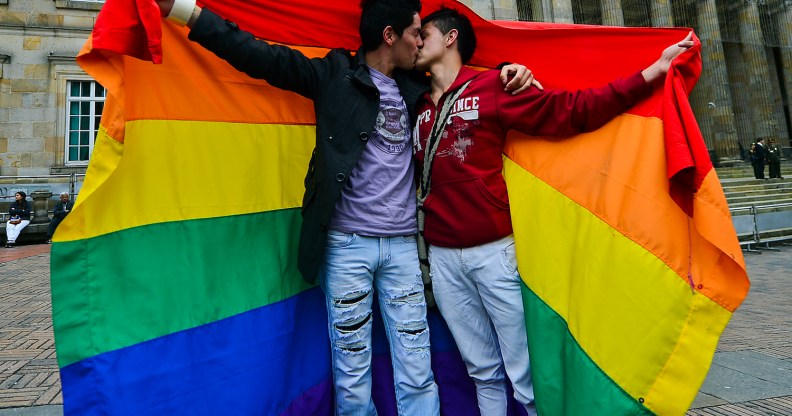Partnered gay men earn less than straight counterparts, but lesbians earn more

Colombian LGBT rally (Getty)
Partnered gay men earn less than their straight counterparts while lesbians earn more, a new study has revealed.
Researchers at the London School of Economics and Political Science (LSE) have tested how sexual orientation and relationship status affects differences in earnings and employment status between heterosexual and homosexual people.

The report stated that the difference in earnings between partnered lesbians and partnered straight women was around 5.5 percent and regarded as “statistically significant”.
However, when only single women were compared earning differentials were practically non-existent.
The opposite was true for partnered gay men, who were found to be penalised for being in a relationship.
Single gay men and straight men had “near zero” difference between their earnings.
In regards to employment status, the study found that gay men were 4.5 percent less likely to be working full-time than their straight counterparts.
When this is isolated to just a comparison of those in a relationship, the figures rises to 6.1 percent.
Bisexual men are twice as likely than gay men not to be working full-time with almost 12 percent (11.9) not working full-time when compared to heterosexual men.
For women, however, the reverse is true.
Lesbians were 8.2 percent more likely to be working full-time than straight women, though bisexual women were 5.4 percent less likely.
Again, when only the partnered sample is considered, lesbians in a relationship are 15.4 percent more likely to work full-time.
Authors of the study stated that their results were consistent with previous studies.
“Traditional heterosexual partnerships typically involve gendered specialisation, with the man more engaged in market activities than the woman, particularly given the prevalence of children among heterosexual couples,” they said.
“Even if the degree of household specialisation were the same in heterosexual and gay male households, gendered heterosexual specialisation means that the average partnered heterosexual man will be more focused upon market activities than the average partnered gay man.”
In a study last year, it was found that bisexual men earn a third less than gay colleagues.
Bisexual people were also found to be more likely to live in poverty or have poor health.

